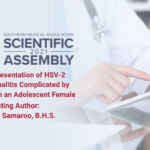Abstract | November 8, 2021
An Atypical Presentation of HSV-2 Meningoencephalitis Complicated by Concurrent STIs in an Adolescent Female
Learning Objectives
- Stress the importance on taking a full and complete social history on adolescent patients.
- Understand the causes and symptoms of meningitis and encephalitis in the pediatric population.
Introduction: Encephalitis is a rare, but serious condition causing neurologic dysfunction due to inflammation of the brain parenchyma. There is a wide variety of infectious causes, one in particular is herpes simplex virus (HSV). The pathophysiology is due to direct invasion of the neurons in the CNS leading to cytotoxicity. In adolescents, encephalitis can present with fever, psychiatric changes, emotional lability, movement disorder, ataxia, seizures, lethargy, coma, or localized neurological changes. Our case is that of an adolescent female who presented with headaches and personality changes, and was found to have a diagnosis consistent with encephalitis.
Case Presentation: We present a case of a 16 year old female, with a history of MDD and distant history of seizures at 10 years old, no longer on medications, who presented with a 2 days of 7/10 throbbing, intermittent, migratory, right sided headaches. Upon arrival her headaches progressed to sharp, 10/10 pain on temporal/parietal right head, fever of 101F, and tachycardia of 107. Patient also stated she had phonophobia, but denied meningismus, numbness, nausea, vomiting or any other symptoms. Basic labs were drawn which showed no signs of infection. CT Brain without contrast was completed and showed no intracranial abnormality.
Given headache and history, neurology was consulted. On exam, the patient was neurologically appropriate. MRI brain without contrast was also within normal limits. She was diagnosed with occipital neuralgia and was started on gabapentin. However, the patient continued with fevers and only had mild alleviation of pain. So we broadened our differential to include infectious causes as well. Physical exam was significant for tenderness to palpation on the right maxillary sinus and right photophobia.
The patient admitted that she was diagnosed with chlamydia, but was noncompliant with the treatment, so we consulted infectious disease who ordered a STD panel. GC/CT NAAT had resulted positive for continued chlamydia infection. We started the patient on ceftriaxone and doxycycline. RPR testing resulted positive of 1:16, with positive FTA Abs. At this time, headaches continued, and given her active syphilis infection, we were now concerned for neurosyphilis. ID recommended a lumbar puncture for CSF VDRL testing. HIV Ag/Ab testing resulted negative. Given new findings, ceftriaxone was discontinued. Gabapentin was continued for the treatment for herpetic neuralgia.
CSF VDRL was negative and the patient was started on PenG for latent syphilis infection. However, the meningoencephalitis panel confirmed HSV-2 encephalitis. She was started on IV acyclovir, and continued with hospital stay for IV acyclovir due to concerns for treatment compliance. She completed doxycycline, acyclovir, and bicillin treatments. Headaches resolved completely. Repeat LP was negative for HSV-2 encephalitis and VDRL again; repeat MRI was within normal limits. She was discharged home on further completion of treatment.
Diagnosis/Management/Outcome: This case illustrates the diagnosis and management of an uncommon presentation of HSV-2 encephalitis in an older pediatric patient. Many children with HSV encephalitis have long-term neurologic impairment, particularly those with delayed initiation of acyclovir. Diagnosis criteria includes having mental status changes, plus 3 of the following: fever, seizures, new focal neurologic deficits, CSF pleocytosis, or neuroimaging/EEG consistent with encephalitis. Although EEG and MRI were negative, we erred on the side of caution based on her unrelenting headaches, emotional lability, and personality changes. Due to having a poor history because of her social situation, we could not rule out a pathological cause for these findings, and chose to treat with a 21-day course of acyclovir. The patient did return to the hospital due to her social situation, and compared to her previous admission, there was a significant difference in her symptoms versus prior to being treated.

